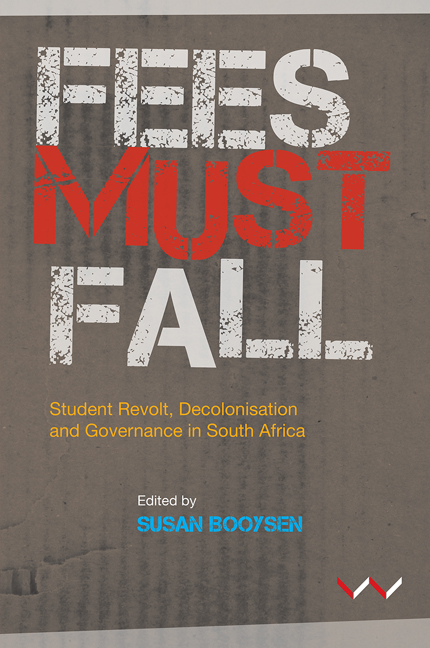Book contents
- Frontmatter
- Contents
- Acknowledgements
- Preface
- Introduction
- PART ONE POWER REDEFINED – ‘WHAT HAPPENED TO GOVERNANCE?’
- PART TWO PRIMARY VOICES – ‘THE ROOTS OF THE REVOLUTION’
- PART THREE THE REVOLT – ‘RISING AGAINST THE LIBERATORS’, SOUTH AFRICA IN AFRICA
- Chapter 6 Standing on the shoulders of giants? Successive generations of youth sacrifice in South Africa
- Chapter 7 Learning from student protests in sub-Saharan Africa
- Chapter 8 Unfinished revolutions: The North African uprisings and notes on South Africa
- PART FOUR POWER AND CLASS REDEFINED – ‘SIT DOWN AND LISTEN TO US’
- PART FIVE JUSTICE, IDENTITY, FORCE AND RIGHTS – ‘WE CAME FOR THE REFUND’
- APPENDICES
- Contributors
- Index
Chapter 8 - Unfinished revolutions: The North African uprisings and notes on South Africa
from PART THREE - THE REVOLT – ‘RISING AGAINST THE LIBERATORS’, SOUTH AFRICA IN AFRICA
Published online by Cambridge University Press: 20 April 2018
- Frontmatter
- Contents
- Acknowledgements
- Preface
- Introduction
- PART ONE POWER REDEFINED – ‘WHAT HAPPENED TO GOVERNANCE?’
- PART TWO PRIMARY VOICES – ‘THE ROOTS OF THE REVOLUTION’
- PART THREE THE REVOLT – ‘RISING AGAINST THE LIBERATORS’, SOUTH AFRICA IN AFRICA
- Chapter 6 Standing on the shoulders of giants? Successive generations of youth sacrifice in South Africa
- Chapter 7 Learning from student protests in sub-Saharan Africa
- Chapter 8 Unfinished revolutions: The North African uprisings and notes on South Africa
- PART FOUR POWER AND CLASS REDEFINED – ‘SIT DOWN AND LISTEN TO US’
- PART FIVE JUSTICE, IDENTITY, FORCE AND RIGHTS – ‘WE CAME FOR THE REFUND’
- APPENDICES
- Contributors
- Index
Summary
INTRODUCTION
On Saturday 18 December 2010, Mohamed Bouazizi, a youth selling fruit and vegetables at a street stall in the provincial town of Sidi Bouzid, Tunisia, set himself alight, after police confiscated his produce. The twenty-six-year-old Bouazizi had a university degree but had struggled to find work, so set up a stall, without a licence. The police demanded a bribe. When he refused, the police confiscated his scales, and slapped him and insulted his late father (see Whitaker 2010; Lageman 2016). When Bouazizi tried to lay a complaint at the government offices he was refused entry. In frustration he set himself alight. Youths angry at Bouazizi's treatment started rioting, smashing cars, shops and official buildings.
The burning figure of Bouazizi and the protests in sympathy with him were posted on social media, Facebook and mobile phones across the country (Daragahi 2011; Whitaker 2010; National Public Radio 2011). Al Jazeera, the pan-Arab television station, broadcast activists’ recordings (Daragahi 2011; Whitaker 2010; National Public Radio 2011). As in the case of South Africa's 2015–2016 student revolt, the protests by a diverse collection of youth (inclusive of students) spread using social media via mobile phones to disseminate the message of revolt and government brutality. Unlike in South Africa – where the protesters took aim, alternately, at university fees and the continuing apartheid legacy of stark racial inequalities in higher education – the North African protesters took aim at the government, and demanded the fall of the Tunisian president Zine El Abidine Ben Ali. He fled a month after the protest started. The protests in Tunisia then spread across North Africa – and several regimes collapsed under the force of the protest. In South Africa, the government was shaken yet remained in power unambiguously.
The North African youth had a broad set of demands for national political, social and economic change. A combination of the delayed effects of the 2007–2008 global financial and Eurozone crisis, rising inequality and high levels of corruption, combined with oppressive regimes, pushed together young people, with little prospects of jobs, and financially hard-pressed middle classes, to call on regimes run by small elites who controlled almost every sphere of society for democratic, social and economic reforms that would end the disenfranchisement of their rights (Gumede 2011; AfDB 2011; ESCWA 2103; Boutayeb and Helmert 2011).
- Type
- Chapter
- Information
- Fees Must FallStudent revolt, decolonisation and governance in South Africa, pp. 169 - 190Publisher: Wits University PressPrint publication year: 2016



